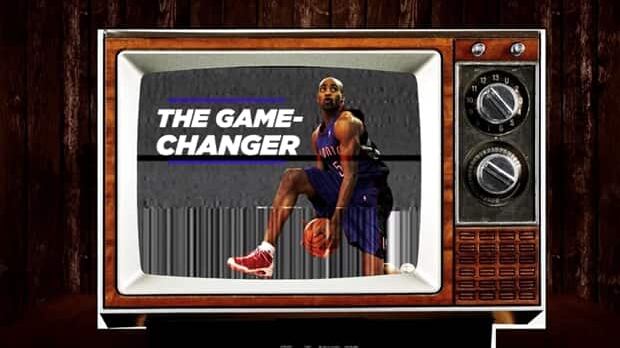Glen Grunwald’s expectations were low for Vince Carter’s pre-draft workout with the Toronto Raptors.
Not because Carter didn’t have the skills or athleticism to be an impact player — he had been a standout for the University of North Carolina Tar Heels, after all. But Carter had a gruelling workout with the Chicago Bulls the day before, and a delayed flight to Toronto meant that he only managed a few hours of sleep before his workout with the Raptors.
“He showed up at the University of Toronto gym there with a big smile, with a lot of energy, with a really positive attitude,” recalled Grunwald on Tuesday. “He was excited to be in Toronto, and was very interested in playing for the Raptors and moving to Canada with an open mind that you often didn’t see in some NBA players.”
And then the workout began.
“He went on to just blow us all away with his great workout, his great athleticism, his high skill level, and his very positive energy,” said Grunwald, the Raptors general manager from 1997 to 2004. “I think from that moment on I was sold on Vince Carter.”
Carter was drafted fifth overall by the Golden State Warriors in the 1998 NBA draft but Toronto immediately traded Antawn Jamison, the fourth overall pick, for him.
That deal launched a Hall of Fame career for Carter, propelled the Raptors to three consecutive playoff appearances (1999-2000, 2000-01, 2001-02) for the first time in the team’s short history, and breathed life into basketball in Canada.
WATCH | Celebrating Raptors icon Vince Carter as his jersey is retired:
Former Raptors player Jerome Williams and announcer Chuck Swirsky discuss why Vince Carter was pivotal to the Raptors organization.
“He brought eyeballs to the Raptors and to the City of Toronto and to the NBA as a whole, people who otherwise would have either not been paying attention or been watching players in other markets.” said John Lashway, Maple Leaf Sports & Entertainment’s senior vice-president of communications and community development at the time. “All of a sudden, they’re focused on the Toronto Raptors and what we were doing.
“He was invaluable to the whole growth of basketball in Canada and probably around the league as well.”
Although Carter’s arrival in Toronto lifted the Raptors’ sagging ticket sales and he helped take them to the post-season, it was his endeavours off the court that Lashway remembers best.
In particular, Lashway remembers how committed Carter was to his Embassy of Hope Foundation, which continues to give back in his native Florida.
“I’ve been doing this a long time and sometimes you get athletes who just affix their name to something because they think it’s perceived to be the right thing to do,” said Lashway, who is now the deputy commissioner of the Canadian Elite Basketball League. “But Vince was genuinely committed to to his community initiatives.
“He showed up at the playgrounds, he showed up at the hospitals. He showed up because he wanted to be there, not because we told him he had to be there.”
A direct line can be drawn from Carter’s emergence as a superstar to the current surge of Canadians in the NBA — peaking at 27 last season — but Grunwald is more concerned with the growth of basketball at the recreational level.
“The participation of youth in basketball has increased dramatically,” said Grunwald, who was chief executive officer of Canada Basketball from 2018-21 and is now an executive adviser to the national sport organization. “We were the fastest growing sport in Canada, and had been for a number of years.
“Part of that was going back to the Vince Carter years, but also some of the Raptors recent success in winning the championship in 2019, and then our competitiveness in the international level.”
The basketball boom sparked by Carter has actually created a strain on resources.
The Canadian Youth Sports Report, published by Solutions Research Group in June 2023, suggests an increase over time in organized youth participation (ages 3-17) in three major team sports: soccer, basketball and volleyball.
Hockey ranks third among all Canadian youth according to the report, but drops to ninth among new Canadians. Instead, new Canadian youth show a preference for soccer, swimming and basketball.
The findings also found that hockey is the top organized sport among youth with Indigenous backgrounds, followed by swimming, soccer, and basketball. Among Black Canadian youth, the top sports are soccer and basketball.
“We’re struggling to provide the resources and the infrastructure necessary to keep up with that,” said Grunwald, adding that it’s a good problem to have. “That includes facilities to play in, coaches to coach, referees to referee and administration.
“It’s an issue that we face where kids that want to play basketball and want to be coached and want to learn the game but don’t have the opportunity.”
Grunwald said that Canada Basketball has been talking to various government agencies and non-governmental organizations about helping us build more facilities.
“We’ve had slow progress in that, but we’re hopeful that people will step up and realize that there’s a great opportunity for basketball, along with a lot of other court sports, to create the facilities for a growing population and a population that’s more and more interested in playing basketball.”
WATCH l Carter’s iconic between-the-legs dunk in 2000 NBA Slam Dunk Contest:
In his third attempt of the 2000 NBA Slam Dunk Contest, Raptors’ Vince Carter all but eliminates the competition with his iconic between-the-legs dunk.

